Artificial Intelligence (AI) is becoming more popular across many industries, including digital marketing, manufacturing, IT, and healthcare. Businesses in these fields are turning to AI to boost their efficiency, make smarter decisions, and encourage new ideas. One area where AI is making a huge impact is in customer service.
In this blog, we will explore the essential aspects of AI in customer service. We’ll cover the benefits of using AI, how to implement it effectively, the different types of AI technologies available, and the future trends shaping AI in customer service.
Let’s get started.
What is AI in Customer Service?
Artificial intelligence (AI) in customer service is all about using smart technology to improve the way businesses communicate with their customers. This includes tools like voicebot AI and AI virtual assistants that can answer questions quickly and accurately. These AI solutions help businesses provide personalized support, making sure customers get the help they need without long wait times.
AI also allows companies to better understand what customers might need before they even ask, which can lead to higher satisfaction. By using AI, businesses can offer support around the clock, making sure customers can always get help when they need it. This technology also helps solve problems more effectively, creating smoother and more enjoyable interactions for customers.
Overall, AI in customer service makes it easier for businesses to keep their customers happy and engaged.
To get the most out of AI in customer service, start by connecting AI tools with the systems you already use and make sure they are trained with your own data. Regularly check how the AI is performing and adjust its responses as needed. Also, keep a good mix of automated and human support.
Benefits of AI in Customer Service
AI is changing the way businesses communicate with their customers, bringing many exciting benefits. Let’s explore some of the key advantages of using AI customer service solutions to see how it can help.
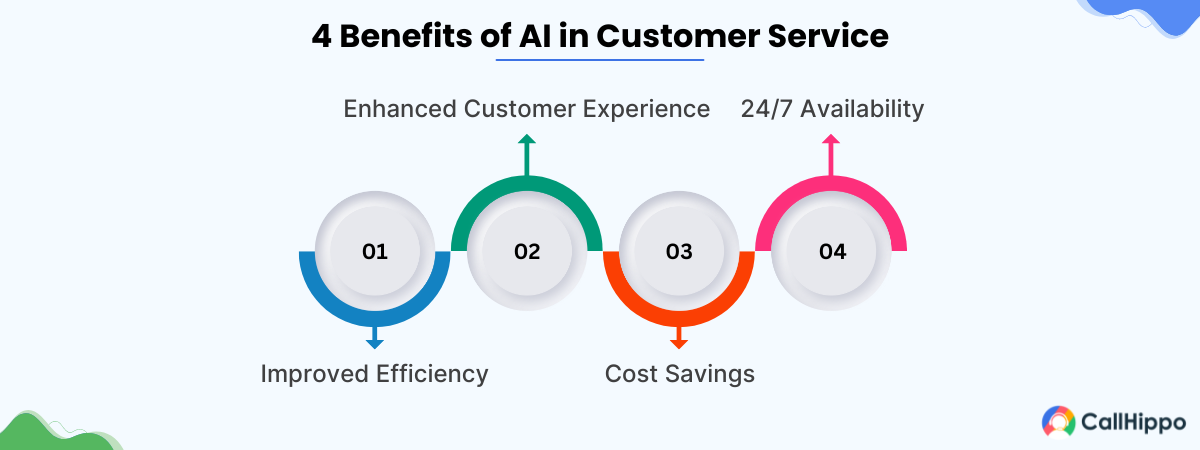
A. Work More Efficiently
AI for customer service, such as chatbots and virtual assistants, makes things easier by taking care of simple questions and tasks automatically. This means customer support teams can spend more time on complicated problems, improving how well they work.
With advanced AI, businesses can quickly generate accurate responses and solutions, reducing wait times and helping everything run more smoothly. By automating routine customer service tasks, AI helps teams focus on more important issues, leading to better customer experiences and increased productivity. Overall, AI is a valuable tool that makes customer service faster, more efficient, and more effective.
B. Make Customer Interactions Better
Artificial intelligence (AI) in customer service makes interactions with customers more personalized and meaningful. These AI platforms study user data to understand what each customer wants, allowing them to offer responses and suggestions that are specifically suited to each individual.
By catering to each person’s unique needs and preferences, AI doesn’t just solve problems—it creates a stronger, more trusting relationship with customers. This personalized approach makes customers feel valued and understood, which leads to higher satisfaction and loyalty.
C. Cut Down Costs
Implementing AI in customer service can lead to substantial cost savings for businesses. By automating repetitive tasks and handling common customer inquiries, AI reduces the need for a large customer service team, which in turn lowers labor costs.
Additionally, AI-driven call centers help minimize human errors and streamline operations, making processes more efficient. These improvements not only cut expenses but also contribute to overall better financial performance for the company.
D. Offer Round-the-Clock Support
One of the biggest benefits of using AI in customer service is that it offers support all the time. Unlike human agents who need breaks and have working hours, AI systems such as chatbots and virtual assistants are available 24/7. This means customers can get help whenever they need it, whether it’s day or night.
With AI handling customer inquiries around the clock, businesses can serve customers from different time zones worldwide without having to spend extra money on additional staff. This always-on support helps improve customer satisfaction and keeps costs down.
10 Ways to Use AI in Customer Service
Artificial intelligence (AI) is changing how we handle customer service, making it faster, more tailored, and more effective. Here are 10 ways to use AI in customer service:
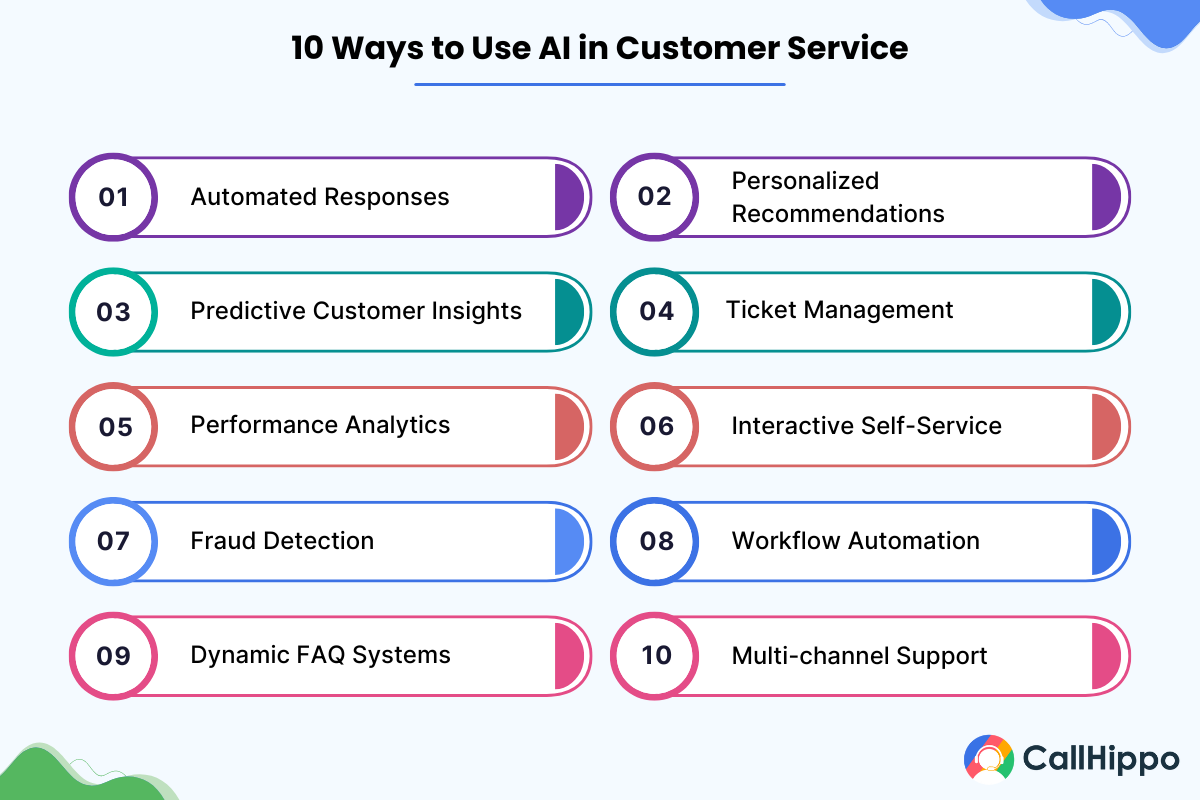
1. Automated Responses
One of the most common ways businesses use AI in customer service is through automated responses. With AI tools like chatbots, companies can quickly and efficiently handle everyday questions from customers. These chatbots work 24/7, providing instant answers any time of day or night. This means customers get the help they need right away, while human agents can spend their time solving more complicated problems.
2. Personalized Recommendations
AI can help businesses offer personalized recommendations by analyzing how customers behave and what they like. For example, an AI customer service system can look at what a customer has bought before and suggest new products or services they might enjoy. This makes the shopping experience better for customers and can also increase sales by showing people products that are just right for them.
3. Predictive Customer Insights
AI-driven predictive analytics can help businesses understand what customers might need or do in the future. By looking at past data and current trends, AI can predict problems before they happen and suggest solutions in advance. For example, if a customer often encounters a specific issue, AI can foresee when they might need help and provide assistance before the problem becomes serious. This proactive approach improves service efficiency.
92% of businesses are using AI-driven personalization to drive growth and revenue
4. Ticket Management
Handling customer support tickets can be a lot to manage, but AI makes it much easier. AI-powered ticket management systems can sort and organize tickets automatically, decide which ones are most important, and assign them to the right team members. This helps keep things running smoothly, makes sure urgent problems get handled quickly, and improves how efficiently your support team works overall.
5. Performance Analytics
AI gives businesses powerful tools to analyze their customer service performance. It looks at important details like how quickly responses are made, how well issues are resolved, and how satisfied customers are. By examining this data, AI helps spot areas where things can be improved and suggests ways to make customer service better. This ongoing, data-driven approach helps businesses keep improving their support services over time.
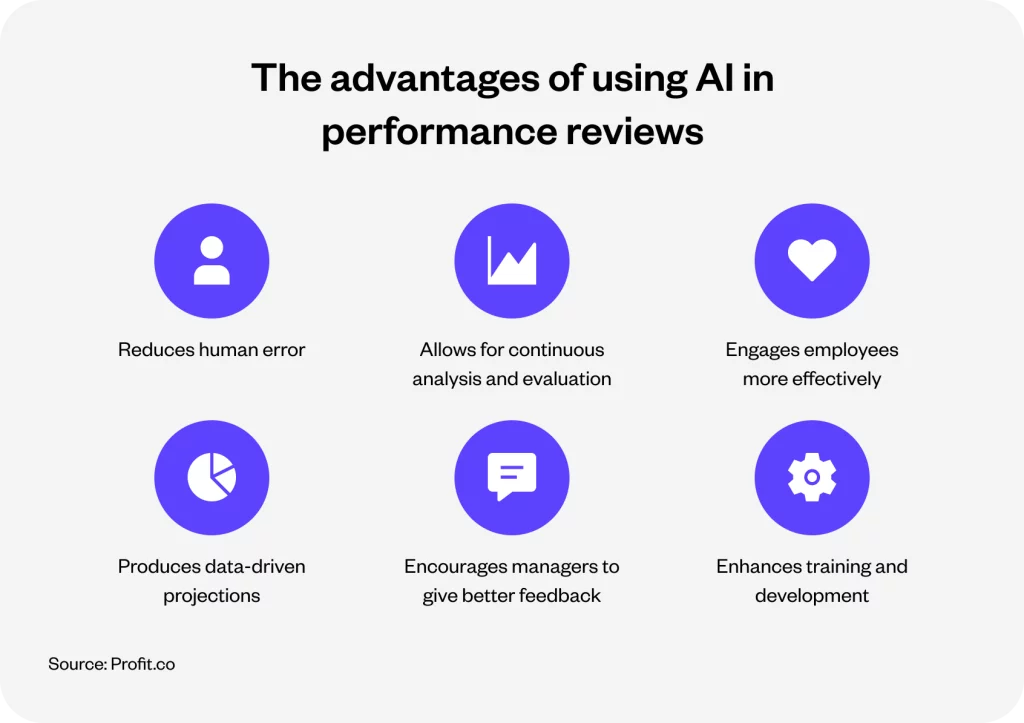
Source: Yellow.ai
6. Interactive Self-Service
Interactive self-service tools, like AI-powered virtual assistants, let customers find answers and solve their own problems. These tools can help users troubleshoot issues, give detailed information, and even handle transactions all by themselves. This means customers can get help whenever they need it without waiting for a human. It also takes some of the pressure off customer service teams, making their jobs easier.
7. Fraud Detection
AI is really important for stopping fraud. It looks at patterns in transactions and how users behave to spot anything unusual. When AI notices something suspicious, it can immediately alert you to potential fraud. This helps keep both customers and businesses safe from fraud, making overall security much stronger. By catching problems early, AI plays a key role in preventing financial losses and protecting everyone’s interests.
AI systems improve fraud detection accuracy by more than 50% compared to traditional methods.
8. Workflow Automation
AI can handle many tasks in customer service operations, making things easier and more efficient. For instance, AI can automatically sort customer questions, update records, and create reports. This reduces the amount of manual work needed and speeds up how quickly things get done. For example, AI can keep customer profiles up-to-date by automatically recording information from interactions, so everything stays accurate and current.
9. Dynamic FAQ Systems
Dynamic FAQ systems that use generative AI for customer service offer accurate and current answers to frequently asked questions. Unlike traditional static FAQs, these dynamic systems can change and improve over time based on new information and customer interactions. This means customers will always get the most relevant and precise information, leading to a better and more satisfying experience.
10. Multi-channel Support
Today, customers use many different ways to connect with businesses, like social media, email, and live chat. Artificial intelligence customer service tools can work across all these different channels, making sure they provide multi-channel support. By keeping track of conversations across various platforms, AI ensures that customer questions and issues are handled quickly and effectively, no matter how they reach out.
By using these AI-powered solutions, businesses can provide outstanding customer service that keeps up with the changing needs of today’s customers. This also helps them stay competitive and meet expectations more effectively.
How to Implement AI Tools in Your Customer Service?
Adding AI to your customer service can change how you connect with customers, making things more efficient and improving their experience. Here’s a simple guide on how to implement AI tools in your customer service:
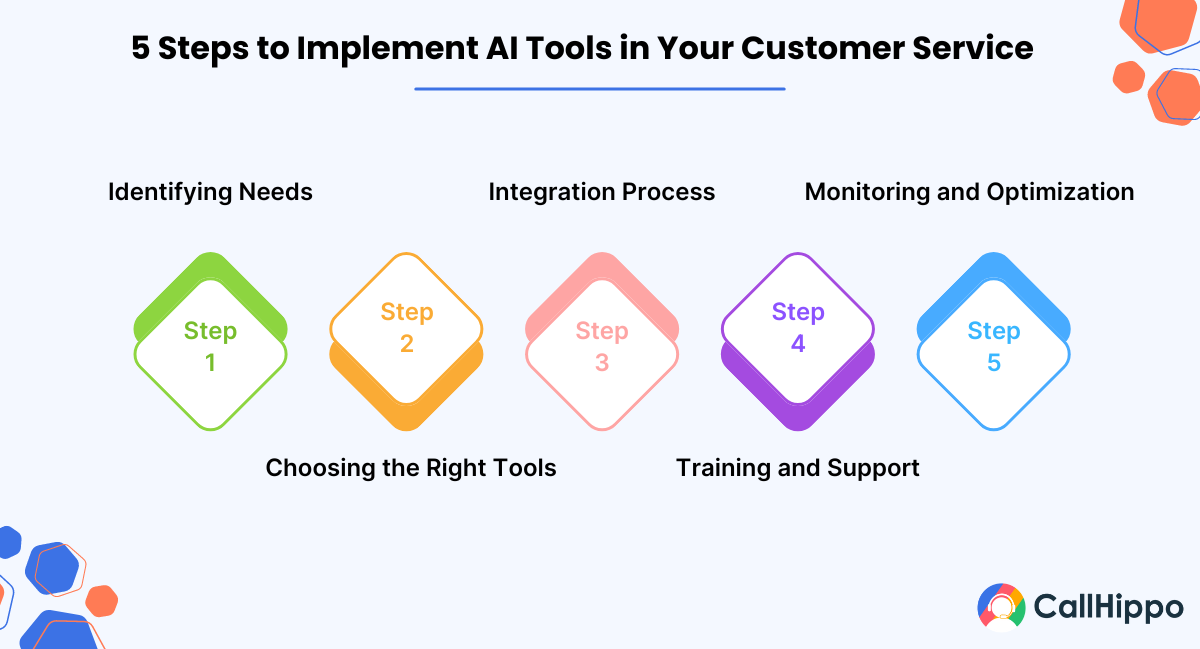
1. Identifying Needs
The first thing you should do when adding AI tools to your customer service is to figure out what you need. Begin by looking at how your current customer service works. Identify areas where AI could be really helpful, like speeding up response times, dealing with repetitive questions, or making interactions more personal.
For example, if your team often answers the same routine questions, using AI customer service solutions with chatbots or virtual assistants could make a big difference. Take note of the challenges you’re facing and see how AI could help solve them effectively.
2. Choosing the Right Tools
After you’ve figured out what you need, it’s important to pick the right AI tools. There are many options available, ranging from simple chatbots to advanced AI systems that can handle more complex customer service tasks. Here are some things to keep in mind when choosing:
- Functionality: Make sure the tool matches your needs. If you only need basic automated responses, a simple chatbot may be enough. For tasks like understanding customer intentions and offering personalized advice, look for AI solutions that use natural language processing (NLP) and machine learning.
- Scalability: Choose tools that can grow with your business. You’ll want conversational AI platforms that can handle more interactions as your company expands.
- Integration: Ensure the tool works well with your current systems, like CRM software. Good integration means a smoother workflow and better data management.
3. Integration Process
Integrating AI into your customer service system involves several steps:
- Setup: Begin with configuring your chosen AI tools. This may involve setting up chatbots, integrating them into your website or messaging apps, and ensuring they can access relevant data.
- Customization: Tailor the AI tools to your specific needs. Customize the chatbots to handle the common customer queries and issues your customers face. If using an artificial intelligence customer service platform, configure it to align with your customer service protocols.
- Testing: Before going live, test the AI tools thoroughly. Run simulations and gather feedback from your team to ensure the tools perform as expected and integrate smoothly with your existing systems.
4. Training and Support
For AI to work well in customer service, it’s important to provide proper training and support.
- Training Sessions: First, make sure your customer service team knows how to use the new AI tools effectively. Arrange training sessions where they can learn how to interact with AI, handle any problems that the AI can’t solve, and use AI insights to improve their work.
- Support Resources: Offer ongoing support through resources like detailed guides, help desks, or experts who specialize in AI. This continuous support will help your team adjust to the new technology and fix any issues that come up along the way.
5. Monitoring and Optimization
After you start using AI tools for customer service, it’s important to keep an eye on how they’re performing and make improvements as needed:
- Track Performance: Watch key indicators like how quickly the AI responds, how happy customers are, and how well problems are resolved. These metrics help you understand how well the AI tools are working.
- Gather Feedback: Collect input from customers and your team to find out what’s working and what isn’t. This feedback will help you make necessary adjustments to improve the AI tools.
- Keep Updated: Regularly update your AI tools with the newest features and security patches. This ensures they stay effective and secure.
Using AI in customer service can greatly boost efficiency and customer satisfaction. By understanding your needs, choosing the right tools, integrating them carefully, training your team, and continuously monitoring their performance, you can make the most of AI solutions.
AI Technologies Used in Customer Service
Customer service is changing quickly with the help of artificial intelligence (AI). AI is helping businesses make their customer service faster, more personalized, and more effective. Here’s how some of these AI technologies are improving customer service:
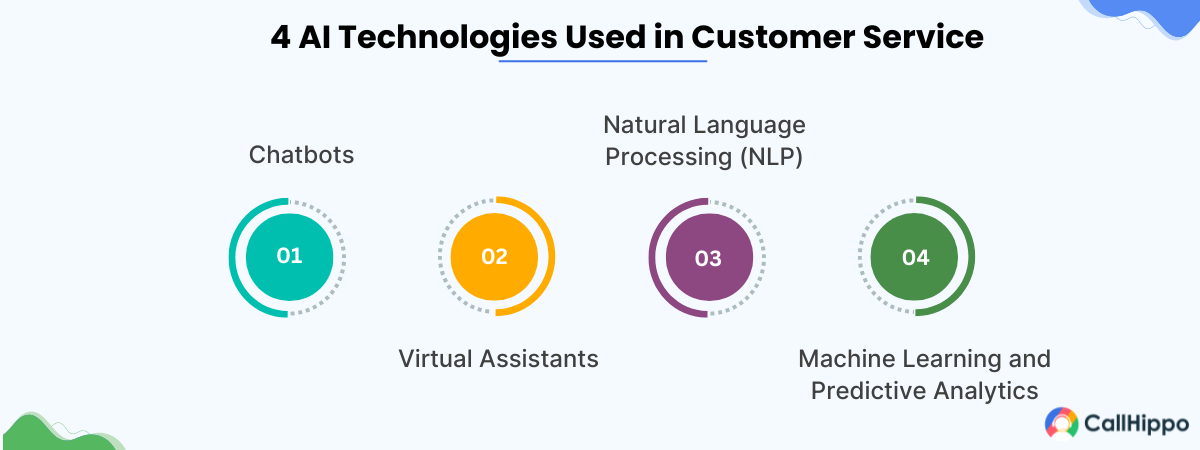
1. Chatbots
Chatbots are a popular AI tool for customer service. These virtual assistants can help with many tasks, like answering common questions or guiding people through complicated procedures. They use pre-written scripts and a technology called natural language processing (NLP) to understand and respond to what customers ask.
Since chatbots work around the clock, customers can get help anytime without waiting for a human agent. This makes customers happier and also eases the workload for human staff.
2. Virtual Assistants
Virtual assistants, like those in AI customer service platforms, are more advanced than basic chatbots. These smart assistants can do things like set up appointments, give personalized suggestions, and handle transactions.
They use natural language processing (NLP) and machine learning to understand the details and subtleties of conversations. They also work well with other systems, providing smooth support across different channels, such as email, social media, and live chat.
3. Natural Language Processing (NLP)
Natural Language Processing (NLP) is a key part of today’s AI for customer service. It helps AI systems understand and interpret human language correctly and in context. Thanks to NLP, chatbots and virtual assistants can grasp what customers are asking, even if they phrase their questions differently.

Source: Github
For example, NLP helps an AI system tell the difference between a customer asking about product details and someone checking their order status. This technology makes responses more accurate, which improves both the customer service experience and how efficiently service operations run.
4. Machine Learning and Predictive Analytics
Machine learning and predictive analytics are powerful technologies that are changing how businesses use AI for customer service. Machine learning works by examining huge amounts of data to find patterns and trends. This helps AI systems predict what customers might do next and offer help before they even ask.
For example, it can spot which customers might need support based on their past actions or purchases. Predictive analytics goes a step further by forecasting future trends and customer needs, allowing businesses to get ready ahead of time and provide more personalized service.
By using these AI tools such as chatbots, virtual assistants, natural language processing (NLP), and machine learning, businesses can offer a quicker, smarter, and more customized service experience for their customers.
What to Consider When Implementing AI-Powered Customer Service?
Using AI for customer service can transform the way businesses connect with their customers. However, to ensure a smooth transition and maximize benefits, consider the following key factors:
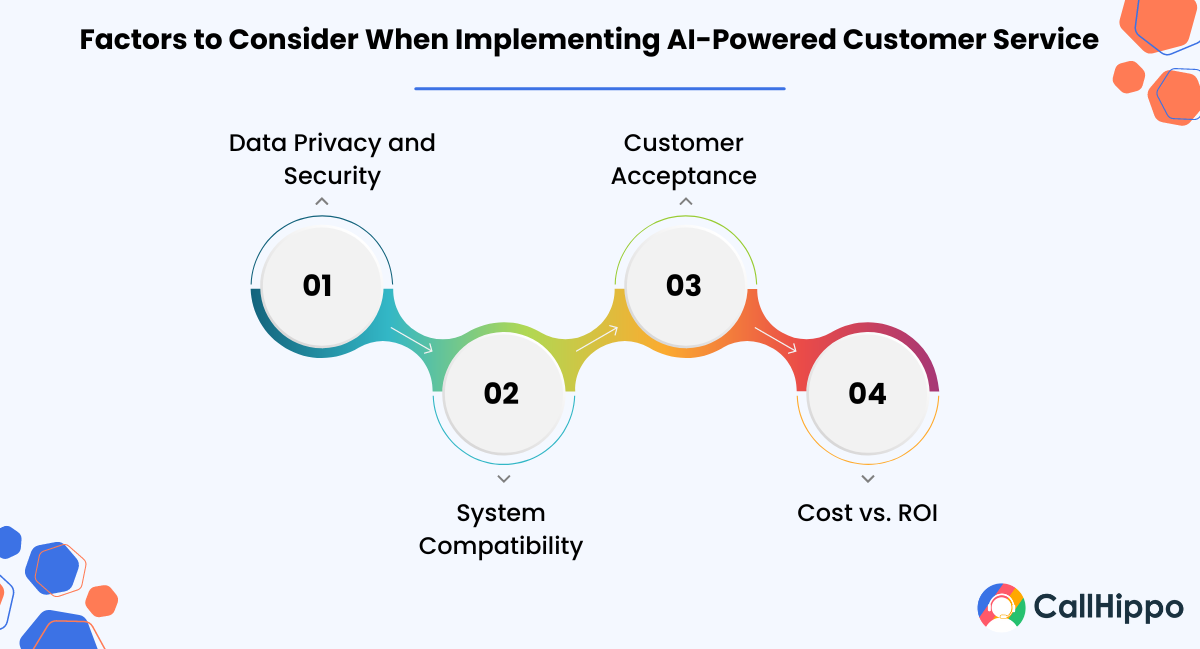
A. Data Privacy and Security
When you start using AI for customer service, keeping customer data safe is very important. AI systems deal with sensitive information, so you need strong security measures. Make sure the AI platform you choose follows data protection rules like GDPR or CCPA.
Use encryption to protect data, secure authentication methods to verify users, and conduct regular security checks to prevent breaches. Building trust and being transparent about data handling helps keep customers confident in your service.
B. System Compatibility
It’s really important to check if AI tools will work well with your current systems. Before you start using an AI customer service solution, look into how it will fit with your existing CRM, support systems, and communication channels.
A smooth connection between the AI and your current setup helps improve your workflows instead of causing problems. For example, if you use AI to handle customer service, make sure it can connect well with your current ticketing systems and databases. This way, it will give you clear and effective support.
C. Customer Acceptance
For AI customer service to be successful, it’s important to make sure your customers are comfortable with it. When you introduce AI chatbots or virtual assistants, you need to plan carefully to meet what your customers expect and like. Talk to your customers to find out how they feel about interacting with AI.
Make sure they have an easy way to reach a human agent if needed. Good training for the AI and a user-friendly design also help create a better experience for your customers.
D. Cost vs. ROI
It’s important to weigh the costs against the benefits when deciding to use AI for customer service. Although there are initial expenses, like buying the technology and training your team, the long-term advantages can be significant. These benefits include lower operational costs and greater efficiency.
To understand the return on investment (ROI), you should look at potential savings from automation, how AI improves customer satisfaction, and its role in business growth. Then, compare these benefits with the upfront costs and ongoing maintenance expenses.
By focusing on these important factors, you can effectively introduce AI-powered customer service tools that boost your business’s efficiency.
Future Trends in AI Customer Service
AI in customer service is changing quickly because of new technologies and changing customer needs. Let’s explore what the future might bring for using artificial intelligence in customer support.
A. Emerging Technologies
One of the most exciting advancements in customer service is the use of generative AI. This technology lets AI systems craft responses and solutions on the spot, which means interactions feel more personal and natural. Alongside this, improvements in natural language processing (NLP) are making it easier for AI to understand and answer complicated questions.
As a result, customer interactions become much smoother and more effective, improving the overall experience.
B. Evolving Customer Expectations
Customers today want faster and more precise responses from businesses. They expect to get help anytime they need it and want service that feels personal and understands their specific needs. Because of this, many companies are investing in advanced AI tools for customer service.
These AI systems are getting better at offering customized experiences, like suggesting products based on past interactions and even predicting what customers might need before they ask. This helps businesses keep up with rising customer expectations.
C. AI Integration with Other Technologies
Combining AI customer service platforms with other technologies is changing how businesses interact with their customers. For example, pairing AI with blockchain technology makes customer data more secure and transparent, so customers can trust that their information is safe.
Similarly, when AI works with Internet of Things (IoT) devices, it provides real-time updates and can offer proactive service, making everything run more smoothly and efficiently. This combination improves the overall customer experience.
The future of AI in customer service looks bright, with smarter and more responsive solutions on the horizon. These innovations will help meet the constantly changing needs of customers, making this an exciting field to keep an eye on.
Conclusion
AI in customer service is changing the way businesses connect with their customers. By using tools like chatbots, virtual assistants, and technology that understands human language, companies can offer quicker and more personalized help. These AI tools can answer common questions at any time of day, making customers happier while letting human agents focus on more complicated issues. Overall, adopting AI in customer service not only makes the process more efficient but also helps businesses stay innovative and ready for the future.
FAQs
1. How do AI chatbots improve customer service?
AI chatbots improve customer service by offering quick and instant answers to customer questions. They can efficiently handle common inquiries and are available around the clock, 24/7. This helps businesses provide better and faster service to their customers.
2. What are the main challenges of AI in customer service?
The main challenges of AI in customer service involve making sure AI gives accurate answers and managing what customers expect. It’s also tough to connect AI with current systems and keep data private.
3. Can AI replace human customer service agents?
AI can’t completely take over the role of human agents. The human touch is essential when dealing with complex problems, offering emotional support, and handling situations that require a deeper understanding and empathy, which AI often struggles to provide.
4. Which industries and businesses benefit most from AI customer service?
Industries such as retail, finance, healthcare, and telecommunications gain significant advantages from using AI in customer service. These sectors rely on AI to manage large numbers of customer interactions efficiently, improve their daily operations, and create better experiences for their customers.
5. How can you keep your data secure when using AI for customer service?
To keep your data safe, start by using strong encryption methods to protect it. Regularly update your security systems and make sure you follow all data protection laws.

Subscribe to our newsletter & never miss our latest news and promotions.









